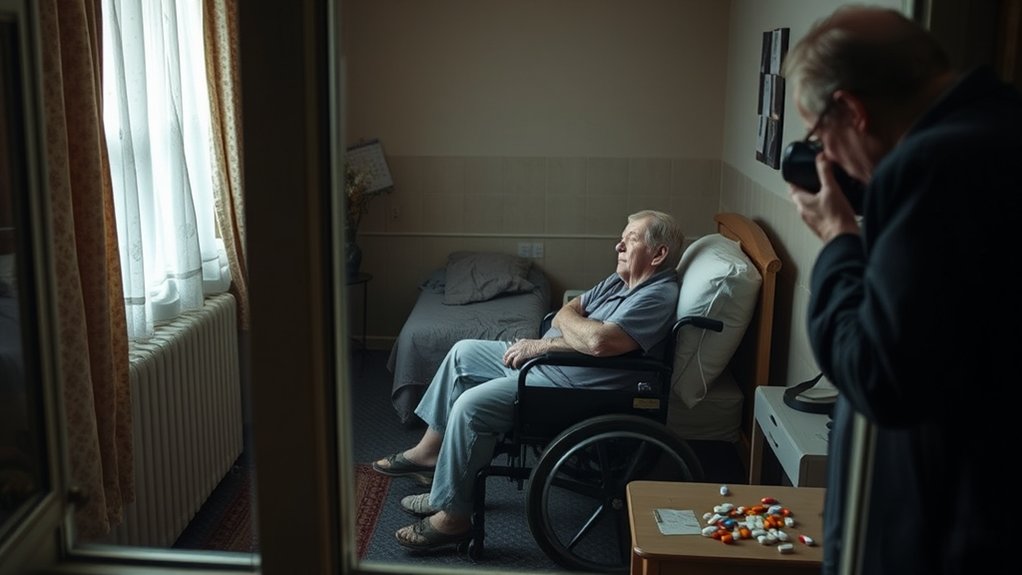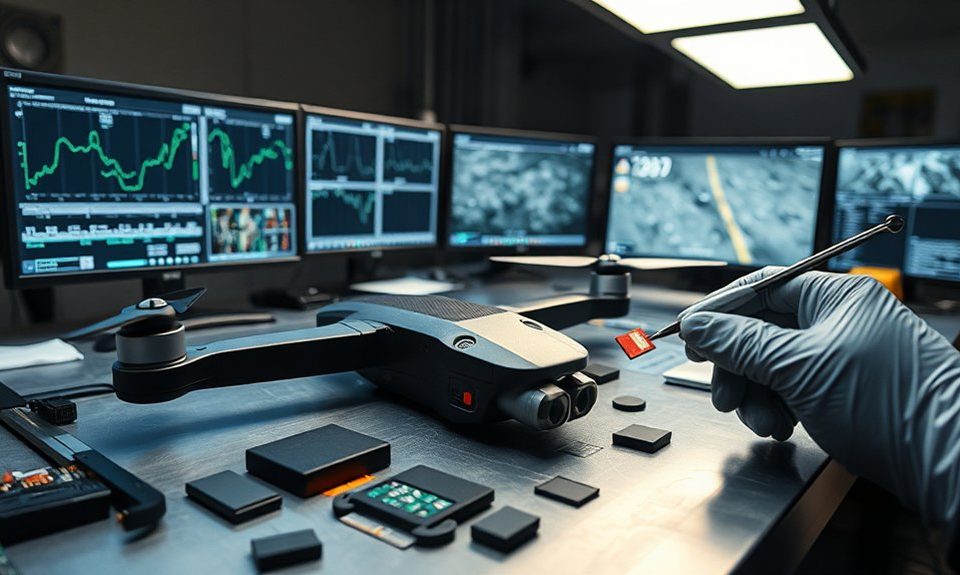Private investigators handling senior care abuse cases employ systematic investigation methods focused on identifying key warning signs and gathering admissible evidence. They utilize discreet surveillance technologies, conduct thorough interviews with staff and witnesses, and maintain detailed documentation while adhering to healthcare privacy laws. Professional investigators follow strict protocols for evidence collection, witness statements, and report preparation. Understanding these specialized techniques reveals the extensive approach needed for effective elder abuse investigations.
Key Takeaways
- Private investigators monitor for signs of abuse through discreet surveillance methods and document evidence using cameras, audio recordings, and detailed reports.
- Investigators conduct thorough interviews with staff, residents, family members, and witnesses while building trust and maintaining confidentiality.
- Careful documentation of all findings, including photographs, witness statements, and chronological logs, is maintained following strict legal standards.
- Investigators ensure compliance with HIPAA and healthcare privacy laws while gathering evidence and accessing medical records.
- Physical signs of abuse like unexplained bruising, bedsores, sudden weight loss, and changes in behavior are carefully documented and investigated.
Signs and Red Flags That Prompt Senior Care Investigations

While senior care facilities aim to provide safe environments for elderly residents, certain warning signs can indicate potential abuse or neglect that warrant investigation. Common neglect indicators include unexplained bruising, sudden weight loss, poor hygiene, bedsores, and unusual changes in behavior or emotional state. Staff members who exhibit hostile attitudes or restrict family visits may raise concerns about resident treatment.
Financial exploitation often manifests through unexpected changes in wills or power of attorney, unusual bank withdrawals, or missing personal belongings. Additional red flags include medication errors, unsanitary living conditions, and untreated medical conditions. When family members notice a pattern of these warning signs, they should document their observations and consider engaging professional investigators to examine the situation systematically and gather evidence of potential misconduct. Conducting thorough background checks on facility staff can help prevent abuse by identifying potential risks before incidents occur.
Surveillance Methods and Evidence Gathering Techniques
When investigators identify potential senior care abuse, they must employ systematic surveillance methods and evidence gathering techniques to build a compelling case. Investigators utilize discreet surveillance technology, including hidden cameras, audio recording devices, and GPS trackers, following strict legal guidelines to maintain admissibility in court.
Evidence preservation is critical throughout the investigation. Investigators document all findings through detailed reports, photographs, and video recordings. They conduct thorough interviews with facility staff, witnesses, and family members, carefully recording statements and maintaining chain of custody for all collected evidence. Medical records, incident reports, and facility logs are meticulously reviewed and secured.
Investigators also monitor daily routines, staff interactions, and facility operations, often employing multiple surveillance points to capture extensive evidence of potential abuse or neglect. Professional investigators from firms like Stillinger Investigations leverage their law enforcement backgrounds to ensure thorough and legally compliant evidence collection in senior abuse cases.
Building Trust and Interviewing Key Witnesses
Successful senior abuse investigations depend heavily on establishing trust with key witnesses and creating an environment where they feel safe sharing sensitive information. Private investigators employ specialized interview techniques that demonstrate empathy while maintaining professional objectivity.
Trust building begins with active listening and showing genuine concern for the witness’s wellbeing. Investigators carefully gauge each witness’s comfort level, adjusting their approach accordingly. They often conduct interviews in neutral locations where witnesses feel secure and uninhibited.
Key witnesses may include facility staff, medical professionals, family members, and other residents. Investigators document each conversation meticulously while protecting confidentiality. By fostering an atmosphere of respect and understanding, investigators help witnesses overcome their hesitation to discuss potential abuse, leading to more thorough and reliable testimony. With over 50 years experience investigating cases in South Carolina, professional investigators know how to handle sensitive situations while maintaining strict confidentiality standards.
Documentation and Report Preparation Standards

Documentation forms the backbone of elder abuse investigations, requiring investigators to maintain meticulous records that meet strict legal and professional standards. Each observation, interview, and piece of evidence must be thoroughly documented using standardized reporting formats that guarantee consistency and professionalism throughout the investigation process.
Investigators must maintain detailed chronological logs of all investigative activities, including dates, times, locations, and persons involved. Photographs, videos, and audio recordings require proper labeling and secure storage to maintain the evidence chain. Written reports should include extensive summaries of findings, witness statements, and supporting documentation, all organized in a clear, systematic manner. This methodical approach to documentation not only supports the investigation’s integrity but also provides a reliable foundation for potential legal proceedings and regulatory compliance. Private investigators ensure all documentation adheres to privacy regulations while maintaining confidentiality of sensitive information about the elderly victims.
Legal Requirements and Healthcare Privacy Compliance
Since elder abuse investigations operate within a complex legal framework, investigators must strictly adhere to federal and state regulations while maintaining healthcare privacy standards. The process requires thorough understanding of HIPAA requirements, state-specific elder protection laws, and facility compliance regulations.
Investigators must balance their legal obligations to uncover abuse while protecting patient confidentiality. This includes obtaining proper authorizations before accessing medical records, following strict protocols when interviewing healthcare staff, and ensuring all evidence collection methods comply with privacy laws. Documentation must be handled securely, with controlled access and proper redaction of sensitive information when necessary. Additionally, investigators need to coordinate with legal authorities and healthcare administrators while maintaining appropriate boundaries between criminal investigation and medical privacy rights. Private investigators’ licenses are required to legally conduct these sensitive healthcare facility investigations.
Frequently Asked Questions
What Is the Average Cost of a Senior Care Abuse Investigation?
Senior care abuse investigation costs typically range from $1,500 to $5,000, depending on services offered, duration, and complexity. Hourly rates for investigative services average between $75-150 per hour.
How Long Does a Typical Senior Care Abuse Investigation Take?
Senior care abuse investigation timelines typically range from two weeks to six months, depending on case complexity, evidence availability, witness cooperation, and documentation requirements for legal proceedings.
Do Private Investigators Need Special Certifications for Senior Care Investigations?
While specific certifications aren’t mandatory, investigators handling senior abuse cases typically pursue specialized training in elder care, investigative techniques, documentation protocols, and interview methods designed for vulnerable populations.
Can Family Members Participate in the Investigation Process?
Family involvement during the investigation process can include providing documentation, sharing observations, identifying witnesses, and reporting concerns. However, direct participation must be limited to protect investigation integrity.
What Percentage of Senior Care Abuse Cases Result in Successful Prosecution?
Statistical data shows successful prosecutions in senior care abuse cases range from 15-25%, though experts believe actual abuse statistics are higher due to underreporting and challenges gathering conclusive evidence.
Conclusion
Private investigators play an essential role in exposing and documenting senior care abuse through systematic investigation protocols. By combining surveillance technology, witness interviews, and meticulous documentation while adhering to healthcare privacy laws, PIs help protect vulnerable seniors from neglect and mistreatment. Their findings provide critical evidence for families, legal authorities, and regulatory agencies to take appropriate action against perpetrators and improve care facility standards.





